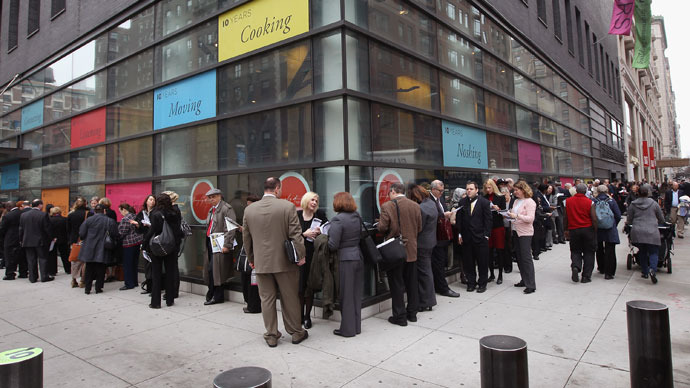No ‘great recovery’ for US – study

Despite the US government’s efforts to boost growth a forecast from the UCLA Anderson School of Management said the anticipated "Great Recovery" hasn't come true and even normal growth is hard to achieve.
The second-quarter UCLA Anderson Forecast released on Wednesday said the growth real GDP is still not enough to help the economy recover from recession, the Associated Press reports.
The government’s extreme monetary easing has boosted growth on the US markets this year; however returning to a normal growth pace will take time. Edward Leamer, Director of the UCLA Anderson Forecast, argues that the “Great Recovery” hasn’t materialized.
He writes that normally the country’s total economic output or GDP grows at 3 percent, however during this year’s first three months the US GDP grew at 2.4 percent. The current growth pace is 15.4 percent below what’s considered a "normal" growth trend, Leamer wrote.
"To get back to that 3 percent trend, we would need 4 percent growth for 15 years, or 5 percent growth for eight years, or 6 percent growth for five years, not the disappointing twos and threes we have been racking up recently," he said. "It’s not a recovery. It’s not even normal growth. It’s bad,” Leamer argues.
It’ll take two more years for US GDP to return to the “normal”
growth rate of 3 percent. The UCLA Anderson Forecast predicts it
will happen in 2015. GDP growth for this year is expected at just
1.9 percent.
The forecast also predicts a decline in unemployment to 6.9 percent next year and to 6.6 percent by 2015. Also the forecast foresees a boost in the US housing market, also pointing to better economic health. The US housing market has been struggling to rise from the depths of recession for several years. The recent rebound in demand has once again lifted the sector.
In the forecast Leamer also highlights the problems the US is
still facing despite efforts to boost growth and fight
unemployment.
"The tepid growth continues to obscure the nation's most fundamental problems: too much government spending funded with too much borrowing, too little national savings to cover late-in-life health care issues and too many workers lacking the skills to compete in the modern economy," the UCLA press statement said.
The study also found that the State of California is feeling much
better than the rest of the country. It has displayed better
results in job growth in the year since April 2012, with only
Utah beating California.











